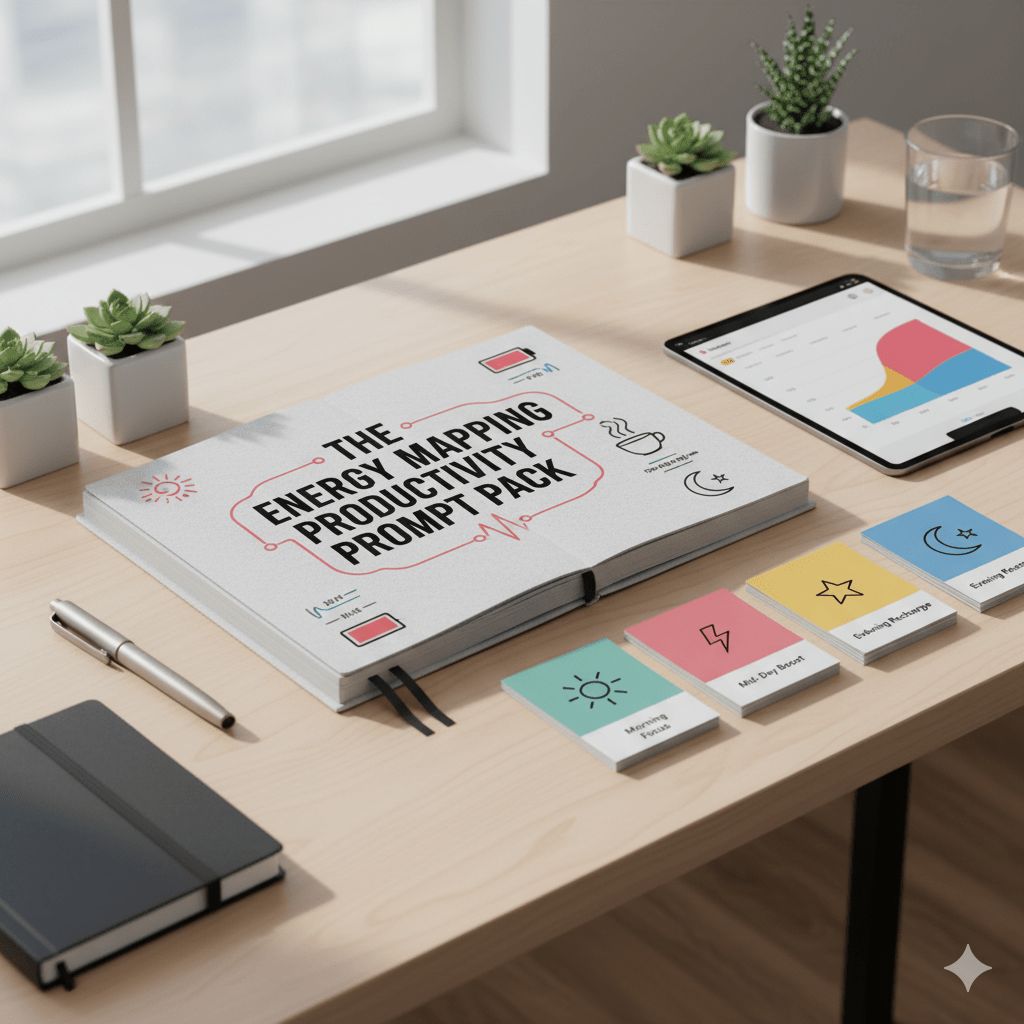- Ark's Newsletter
- Posts
- The Productivity Delusion: 5 Reasons Managing Your Time Isn’t Working
The Productivity Delusion: 5 Reasons Managing Your Time Isn’t Working
It’s Monday morning, and your calendar is already a mess. Back-to-back meetings and a dozen high-priority tasks stare back at you, a chaotic puzzle you must solve before any real work begins. You start rearranging things manually, and before you know it, 30 minutes have vanished.
This scenario is the modern professional’s paradox. We are working longer hours than ever, armed with an arsenal of time-management tools, yet we feel increasingly exhausted, disengaged, and unproductive. The conventional wisdom to simply put in more time has backfired. This approach has backfired, contributing to a workplace culture of diminishing engagement, rising burnout, and soaring medical costs.
The problem isn’t our lack of time but our mismanagement of energy. Time is a finite resource; once spent, it’s gone forever. Energy, however, is renewable. This simple shift in perspective is the key to unlocking sustainable high performance.
Here are five surprising and impactful takeaways from experts that challenge conventional productivity wisdom and reveal a better way to work.

1. You’re Managing the Wrong Resource—It’s Energy, Not Time
The foundational concept for achieving sustainable high performance is to manage your energy, not your time. Energy is the true capacity to do work, and it comes from four distinct dimensions: the body (physical energy), emotions (the quality of our energy), the mind (our focus), and the spirit (our sense of purpose).
This reframes the entire goal of productivity, moving us away from a mechanistic, industrial-age mindset of “extraction”—squeezing more hours out of the day—to a holistic, human-centric practice of “investment.” The objective is no longer a war against the clock but the art of cultivating our capacity to bring more value to the hours we have. It’s about self-regulation and renewal.
As leadership coaches Jim Loehr and Tony Schwartz famously wrote:
Energy is the currency of performance. To perform at your best, you must manage your energy, not just your time.
This insight transforms time from a tyrant to be defeated into a container to be filled with our best, most focused energy.
2. The Opposite of Productive Isn’t Lazy—It’s “Shallow Work”
We often mistake a day filled with activity for a day filled with progress. However, not all work is created equal. In his book Deep Work, Cal Newport draws a critical distinction between two types of tasks:
Deep Work: Cognitively demanding tasks performed in a state of distraction-free concentration that create new value and are hard to replicate. Think of it as coding a new software feature, writing a comprehensive strategy document, or mastering a difficult new skill.
Shallow Work: Non-demanding, logistical-style tasks often performed while distracted and are easy to replicate. This includes responding to routine emails, scheduling meetings, or making status updates.
The modern workplace has fallen into the trap of “Busyness as a Proxy for Productivity.” In knowledge work, where clear indicators of value are often scarce, many professionals default to performing visible activities like constant emailing and attending frequent meetings. Business trends like open offices and the rise of instant messaging culture actively undermine our ability to perform deep work, creating environments optimized for distraction.
Herein lies the power of this distinction: it finally gives a name to the pervasive feeling of working a full day but feeling as though nothing of consequence was accomplished. We mistake the motion of shallow work for the progress of deep work.
In the absence of clear indicators of productivity, employees often equate visible activity (busyness) with effectiveness, leading to behaviors such as constant email communication and frequent meetings at the expense of deep work.
But this addiction to busyness isn’t just a bad habit—it’s actively reinforced by the scientific reality of our own biology, which craves rhythm and rebels against relentless demand.
3. Your Brain Craves Breaks (According to Science)
The “hustle culture” that encourages powering through exhaustion is fundamentally at odds with human biology. This mindset operates on a flawed economic metaphor, treating human beings like machines that can run continuously without consequence. But we are not machines; we are biological organisms governed by natural cycles.
Performance science shows that our bodies operate according to “ultradian rhythms”—90- to 120-minute cycles during which we move from a state of high energy into a physiological trough. Toward the end of each cycle, your body sends clear signals it needs a break: you start feeling restless, find yourself yawning, or notice your concentration beginning to fade. When we ignore these signals, our energy reservoir burns down as the day progresses, leading to diminishing returns.
Intermittent breaks are therefore not a sign of weakness but a strategic act of high-performance discipline, akin to how elite athletes manage recovery to sustain peak output. Critically, the quality of renewal is more important than its length. Even a few minutes can provide significant recovery if it involves a ritual that allows you to disengage from work and “truly change channels,” whether that’s talking to a colleague about a non-work topic or taking a short walk.
While intentional breaks are crucial for recharging our energy, the real battle for focus is also waged in the small, in-between moments when we reflexively reach for our biggest source of distraction.

4. Your Phone Isn’t Just Distracting You—It’s Rewiring Your Brain
One of Cal Newport’s most counterintuitive rules for achieving deep work is to “Embrace Boredom.” The core argument is that if we constantly relieve every moment of potential boredom with a quick glance at a smartphone or other distraction, we impair our brain’s ability to sustain focus.
This reveals a profound and unsettling truth about modern work. The challenge isn’t just about mustering willpower in a moment of temptation; it’s about a long-term degradation of our cognitive capacity for concentration. We are not just distracting ourselves; we are training our minds to crave distraction. This creates a vicious cycle: a brain rewired for novelty will naturally prefer the low cognitive load of shallow tasks over the sustained focus required for deep work.
If every moment of potential boredom in your life… is relieved with a quick glance at your smartphone, then your brain has likely been rewired.
The solution is to be as intentional about our downtime as we are about our work time. This involves scheduling breaks from focus, not from distraction. By intentionally practicing disconnection—going for a walk without your phone, for example—you can rebuild the “mental muscle” required for sustained concentration, making it possible to once again tackle the deep work that matters. This battle for our attention extends to the very tools we choose to manage our days.
5. The Best Tools Give You More Control, Not Less
In the search for productivity, many have turned to advanced AI scheduling tools that promise to fully automate the day. For many users, however, this has backfired. Tools that auto-organize tasks and unpredictably reshuffle schedules can create a “new kind of friction,” making users feel their schedule is no longer their own. Instead of feeling in control, they find themselves constantly adjusting to the whims of an algorithm.
This experience has fueled a growing preference for tools that support “intentional planning.” Platforms like Morgen and Sunsama are built on the philosophy that AI should offer suggestions and support, but the user must retain final approval and control. They help you plan with intention, not just automation.
This trend reflects a maturing relationship with our technology. We are moving beyond a blind faith in automation and toward a demand for tools that augment human agency and wisdom, not replace them. The goal is not to have our intentions overridden but to have them clarified and supported.
Conclusion: A New Question for Productivity
True, sustainable productivity isn’t about managing every minute or finding the perfect app. It’s about a fundamental shift in focus: from managing time to intentionally managing our multidimensional energy. By aligning our work with our natural rhythms, distinguishing deep from shallow tasks, embracing restorative breaks, and using technology as a tool for intention, we can achieve more without burning out.
Instead of asking, “How can I get more done today?” What if you started by asking, “How can I best invest my energy today?”